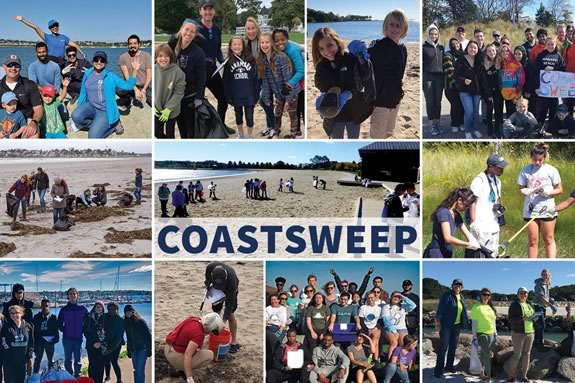
Living on the North Shore has a lot of benefits, and one of the best is our proximity to the beach. Wherever you might be living or visiting on the North Shore, you are never more than a half-hour car ride from the nearest spot to bury your toes in the sand. We have miles and miles of beautiful beach available to us, and it's our obligation to help keep it clean. Each September through November, thousands of volunteers throughout Massachusetts turn out for COASTSWEEP—the statewide coastal cleanup sponsored by the Massachusetts Office of Coastal Zone Management (CZM). Our list of 2024 North Shore Coastsweep Cleanups
COASTSWEEP - The Annual Statewide Coastal Cleanup
COASTSWEEP, organized by the Massachusetts Office of Coastal Zone Management, is part of an annual campaign to raise awareness of marine debris and clean beaches on the coasts of oceans, rivers, lakes, marshes and ponds. It relies on volunteers from local communities to step up and provide the man power to clean debris and litter from the shoreline of their local bodies of water.
In Massachusetts, volunteer rates have consistently increased since 1987. The annual cleanup has grown over the years, resulting in 160 miles of coastline, river bank, marsh, seafloor, and lakeshore in eastern Massachusetts, 2856 volunteers and 18,197 pounds of debris from 148 locations in 2022 alone.
Most of the trash comes from from nearby roads, parking lots and fields that is blown into the water. Some of the trash is directly from marine activities and unfortunately some is left right on the beach by the very people who use it. What's in that giant pile of trash? All kinds of stuff that doesn't belong on our beaches like toilet bowls, rubber boots, pieces of fishing net, truck tires, industrial tubing, milk crates, vinyl siding, cigarette butts, furniture, and mountains of paper and plastic debris.
COASTSWEEP isn't just another beach clean up either. Participants are encouraged to quantify what they find and collect on data cards during the cleanup and handed over to organizers. This data is then sent to the Ocean Conservancy in Washington DC, where its kept in a massive database of the International Coastal Cleanup program. The data is then analyzed, and used to identify patterns of marine debris and its source, which helps in developing comprehensive coastal management policies.
Take part in COASTSWEEP this year, and bring your kids to show them conservation by example! You'll learn a lot, have a great time and give back to your community in a way that will really make a difference. Your kids will be able to see their contribution to the cleanup as part of the whole - which make a lasting impact on how your child will value their own effort. You'll be cleaning up today's trash and helping to eliminate the same kind of trash ever making it to the beach in the future. Last but not least, you'll also have the chance to spend another great day at the beach!














